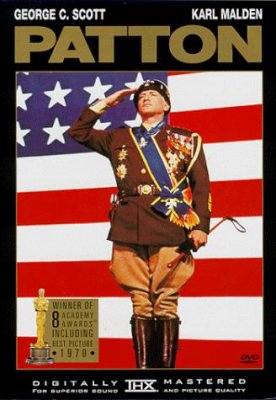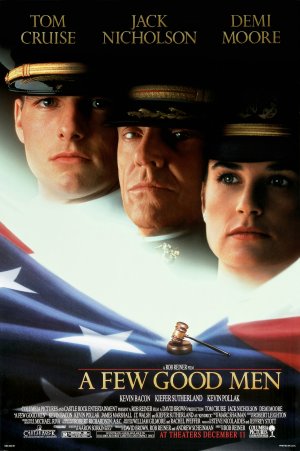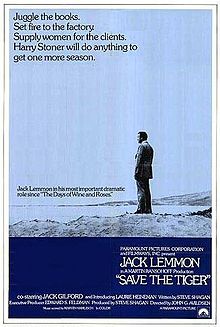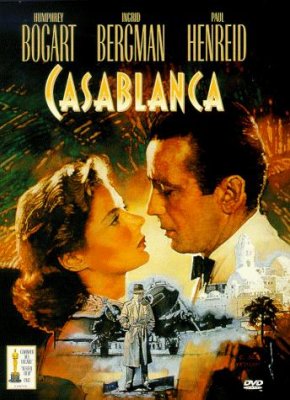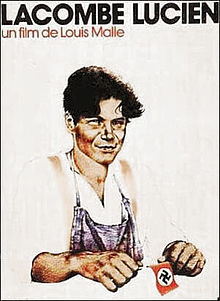
‘Patton’ — The things humans can accomplish when they
believe in the system
“Patton” is only The Most Important Film Ever Made.
Patton is about following orders. Doing what you are told. Being pushed. Becoming better. When you follow orders, you win. The strongest point the film makes is in favor of the institution. In “Patton,” nothing is greater. The general respects it. He’s just a bit of a rebel, that is his undoing. Is he right? Probably, but only in the most dangerous way. Turn the Nazi army around and fight the Russians with them. He accepts the consequences of his outspokenness as a good soldier should. And here we have the ultimate movie for 1970 and a cinematic sea change — the rebel who just might’ve known better than the politicians, but wouldn’t quite go that far.
Were this film made in 1950, that would not be an extraordinary theme. For 1970, it is the most famous last stand against a pop culture revolution that irreversibly changed the arts and Americans’ way of life.
“Patton,” like its protagonist, was chosen by history, not the other way around. Cinematic and music historians will point to a time span, roughly 1965-’75, where America noticeably changed. Some will suggest the JFK assassination, the Beatles or even Elvis as the beginning; others contend Watergate or the end of the draft or the election of Ronald Reagan were the true end. This was no statistical change, but an emotional one. How we felt about things.
“Patton,” according to the Internet Movie Database, opened nationally April 2, 1970. What was sayable, showable, allowable in the years around its release was changing forever. Observers will point to 1967 as sort of the beginning of “New Hollywood,” ushered in by “Bonnie and Clyde” and others. “Patton” was a revival of Old-School, a tribute to those pining for America’s past in the midst of a turbulent, irreverent present.
Almost every film that has followed, as well as some beforehand, smashes those barriers. Examples too countless to list dot the Hollywood landscape, but consider some notable Oscar entries ... “One Flew Over the Cuckoo’s Nest” (the institution is leading to failure); “All The President’s Men” (can’t trust the folks at the top); “The Deer Hunter,” “Apocalypse Now” and “Platoon” (no glory in war; only hell); “A Few Good Men” (the military is corrupt); “Unforgiven” (there’s serious ambiguity between right and wrong); “Good Will Hunting” (people should not be pushed, but nurtured).
“Patton” defies those notions but is more sympathetic than it lets on. In the end, we have to obey authority. But in rebellion, there is glory. According to the IMDB, “Patton” was known internationally by assorted other titles, including “Patton — Rebel in Uniform,” “Patton: A Salute to a Rebel” “Patton: Salute to Glory.” Rebellion makes the movie far more than a conventional biopic. “Patton” succeeds where many other lauded efforts (“Ray,” “Walk the Line”) have not. This movie is about a larger-than-life character in one particular field — military service — that would soon cease to produce any more larger-than-life characters. This is not about a successful leader in a successful campaign, this is about the end — the end of the generalissimo, an archetype that dominated human civilization since its inception.
Patton is the perfect individual to deliver this story. It can and should be noted that Douglas MacArthur is an even stronger candidate — he was fired by the president several years after Patton had died; he famously declared “In war, there is no substitute for victory.”
But Patton believed in reincarnation and saw himself as the continuation of a long line of noble warriors. He speaks of ancient battle sites as though he were there, because he believes that he was. Thus we have a protagonist who not only ideally represents the archetype, but is well aware that he does.
Those of us who grew up after Korea, or at least after Vietnam, have never witnessed a Patton and never will. Today’s military operations by the major world powers are generally fought not over survival, but sanctions, principles, Geneva conventions, international rules and guidelines. And so those who run them at the top are generally bureaucrats, technocrats, diplomats, even on some level humanitarians, who must meet a rapidly increasing moral/sensitivity criteria in each engagement.
Patton, like great conquerors of centuries past, fights for survival and glory, but more of the former than the latter, as he eloquently declares in his powerful final statement. He casually walks through active battlefields, well before Col. Kilgore of “Apocalypse Now.” He carries a pistol, and uses it, and wears black gloves, probably the second most famous movie character to wear black gloves after Darth Vader.
In private, we see another Patton, a scholarly type with owl-like glasses who designs his own appealing uniforms. He prays on his knees and reads the Bible every day.
There is a statement being made in Patton’s hospitality. The movie opens at the site of an American defeat in Morocco, and Patton’s quarters are sparse and lightly defended, as is realized when German planes strafe the building during dinner.
Gradually, as he begins ringing up victories and advancing through Sicily, Patton’s headquarters come to resemble a palace, up until his ouster as 7th Army chief. Everywhere he goes, the local reaction for him is enormous. The liberator has arrived and the people adore him.
Despite the ugliness of war, Patton’s world is bright. The sun shines on North Africa and Sicily even as the bombs fall. This is a gladiator on the path to glory. The battle scenes are not extraordinary and not nearly gritty enough for today’s audience. The typical wounded soldier has a bandage around his head. This is a tough business, but these are winners.
Patton in several ways connects with his foot soldiers. But clearly there is hubris. He surrounds himself with aides who shower him with praise. When his commanders object to his plans, he warns them they can either obey, or be replaced.
The conflict in “Patton” is not so much with the Axis Powers, but with his own rivals among the Allies for publicity. It is strongly implied that Patton makes important decisions to serve his own propaganda interests rather than the best interests of the Allies. But it is also strongly implied that bureaucracy risks undermining the American cause, that too many significant favors are granted to Montgomery and later the Russians to avoid ruffling feathers. Patton is doing the right thing for the wrong reasons.
“Patton” reminds us, as does “Shane,” of an advanced society’s tenuous relationship with warriors. Shane is needed to safeguard a community that does not welcome gunfighters. Patton is needed to win a world war by a society that will not let him slap his soldiers, by leaders and civilians who themselves may not be capable of ordering thousands of young men into dangerous but necessary battle zones with a clear conscience, knowing many of them are never going home.
Karl Malden’s depiction of Omar Bradley is one of the all-time great supporting roles. Here is the technocrat, highly competent, playing it by the book, the understudy to the warrior, and as America’s military role in the world evolves rapidly between 1941 and 1945, he is the one who emerges most in demand, a consensus builder who will fight based on the rapidly evolving modern standards. At one point he tells Patton, “I do this because I’ve been trained to do it ... you do it because you love it.”
A friend insists “Patton” has a serious problem in that “the best part is the first five minutes.” He has a point. One can just imagine the troops listening to the general before an incursion, perhaps D-Day, chills running down their spines. But the intro is not a pep talk; it’s more like a world view. Winners die, but they do not sacrifice. The goal — and satisfaction — is not to fight, but to win.
Those captivated by the opening scene might assume Patton motivated soldiers through great speeches. In fact his speechmaking was not considered great. And what the movie gradually illustrates, beautifully, is the success of relentless pushing, how human beings, ironically, accomplish great things when they don’t necessarily want to.
We see armies that are forced to advance with no sleep against ruthless opposition. Even during relaxed moments after victories, they are disciplined if they stray from extremely rigorous eating schedules or dress codes.
There is a natural human reaction to rebel against such directives that are considered unusual. Few are happy to be told by their boss that they must work an extra half hour every night to perform another task. What does not occur to them initially, and may never occur to them at all, is how this extra effort makes them better employees and their companies stronger. Bosses who make such demands take a risk — if they are ineffective leaders, they are hated and seen as sadistic.
An opposing example exists in “Good Will Hunting,” the Matt Damon vehicle that is also reviewed on this site. In “Hunting,” two professors nearly come to blows over whether a young genius should be pushed to expand his intelligence capabilities.
The two films are a fascinating study in contrasts, and generations. People in General Patton’s world would look down on Will, a massive underachiever dependent on fragile psychotherapy. The viewpoint of “Hunting” is that life’s abuses cause deep-rooted harm, that they cannot or should not be shrugged off for the sake of objective goals.
The bridge between the two worlds is the implicit, unstated outcome of “Patton.”
In his opening speech, Patton tells his troops, “Thirty years from now, when you’re sitting around your fireside with your grandson on your knee and he asks you, ‘What did you do in the great World War II,’ you won’t have to say, ‘Well, I shoveled s--- in Louisiana’.” What did General George Patton do? The standard answer is “defeated the Nazis in Africa and Europe,” but the deeper answer is, some of the toughest, most effective military campaigns ever experienced.
Just as we see Patton’s relentless drive outperforming his peers and more importantly, defeating the German army, we see the evolving standards of Western society eclipsing Patton. The greatest warrior of the European Theater is defeating history’s most legendary opponent, the Nazis, but is not leading the charge into Berlin; that assignment is gradually handed to more methodical, standardized figures Bradley and Eisenhower.
The interest in Patton’s services wanes the closer he gets to the capital. After the guns are silenced, he is deemed an outright liability, a serious risk to the newfound, highly uncertain balance of power in the world. A little of that can be shown well visually, specifically his standoffishness at the Soviet dance. But it’s an otherwise difficult concept to illustrate, so the movie relies on face-to-face chats and messages. They will not send him to the Pacific, where an epic struggle still rages. And so he knows his day is over, that he has likely fought in history’s last conventional world war, and incredibly, dies just a few months later after a routine traffic accident in which his fellow passengers were unhurt and the Jeep itself was repaired and reused.
“Patton” was made at the height of American involvement in the Vietnam War and was probably applauded by those of pro-military sentiment disheartened by the backlash during Vietnam. In the years following the Vietnam War, cinema has re-embraced the war hero in pictures such as “Saving Private Ryan” and “Letters from Iwo Jima,” although those films and the modern genre also carry profound social and humanitarian concerns rarely evident in “Patton.”
The general declares, in his stunning closing line, “Glory is fleeting.” It is stunning not just for its accuracy, but misperception. Patton, of all people, underestimates the magnitude of the victory his soldiers produced. They did not wear neckties and go sleepless to deliver a conqueror to the streets of Europe. They did it to deliver from tyranny a safe, free Europe and beyond whose glory is very much appreciated today.
4 stars
(September 2008)
(Updated March 2011)
“Patton” (1970)
Starring George C. Scott as Gen. George S. Patton Jr. ♦ Karl Malden as Gen. Omar N. Bradley ♦ Stephen Young as Capt. Chester B. Hansen ♦ Michael Strong as Brig. Gen. Hobart Carver ♦ Cary Loftin as Gen. Bradley’s driver ♦ Albert Dumortier as Moroccan Minister ♦ Frank Latimore as Lt. Col. Henry Davenport ♦ Morgan Paull as Capt. Richard N. Jenson ♦ Karl Michael Vogler as Field Marshal Erwin Rommel ♦ Bill Hickman as Gen. Patton’s driver ♦ Patrick J. Zurica as 1st Lt. Alexander Stiller ♦ James Edwards as Sgt. William George Meeks ♦ Lawrence Dobkin as Col. Gaston Bell ♦ David Bauer as Lt. Gen. Harry Buford ♦ John Barrie as Air Vice-Marshal Sir Arthur Coningham ♦ Richard Muench as Col. Gen. Alfred Jodl ♦ Siegfried Rauch as Capt. Oskar Steiger ♦ Michael Bates as Field Marshal Sir Bernard Law Montgomery ♦ Paul Stevens as Lt. Col. Charles R. Codman ♦ Gerald Flood as Air Chief Marshal Sir Arthur Tedder ♦ Jack Gwillim as Gen. Sir Harold Alexander ♦ Edward Binns as Maj. Gen. Walter Bedell Smith ♦ Peter Barkworth as Col. John Welkin ♦ Lionel Murton as Third Army chaplain ♦ David Healy as Clergyman ♦ Sandy Kevin as Correspondent ♦ Douglas Wilmer as Maj. Gen. Francis de Guingand ♦ John Doucette as Maj. Gen. Lucian K. Truscott ♦ Tim Considine as Soldier who gets slapped ♦ Abraxas Aaran as Willy ♦ Clint Ritchie as Tank captain ♦ Alan MacNaughton as British briefing officer
Directed by: Franklin J. Schaffner
Written by: Francis Ford Coppola
Written by: Edmund H. North
Written by: Ladislas Farago (book)
Written by: Omar N. Bradley (book)
Producer: Frank McCarthy
Associate producer: Frank Caffey
Original music: Jerry Goldsmith
Cinematography: Fred Koenekamp
Editing: Hugh Fowler
Art Direction: Urie McCleary, Gil Parrondo
Set Decoration: Antonio Mateos, Pierre-Louis Thevenet
Makeup: Dan Striepeke, Del Acevedo
Stunts: Joe Canutt, Stefano Capriati, Bill Hickman, Kim Kahana, Cary Loftin
